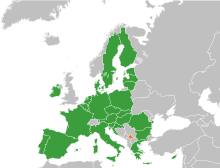
Back انضمام كوسوفو إلى الاتحاد الأوروبي Arabic Pristupanje Kosova Evropskoj uniji BS Ένταξη του Κοσσυφοπεδίου στην Ευρωπαϊκή Ένωση Greek Adhesión de Kosovo a la Unión Europea Spanish Procédure d'adhésion du Kosovo à l'Union européenne French Pristupanje Kosova Europskoj uniji Croatian Կոսովո-Եվրոպական միություն հարաբերություններ Armenian Rencana bergabungnya Kosovo dengan Uni Eropa ID Adesione del Kosovo all'Unione europea Italian Приклучување на Косово кон ЕУ Macedonian
| Accession of | ||||||||||||||||||||||||||||||||
|---|---|---|---|---|---|---|---|---|---|---|---|---|---|---|---|---|---|---|---|---|---|---|---|---|---|---|---|---|---|---|---|---|
 | ||||||||||||||||||||||||||||||||
| Status | Potential Candidate | |||||||||||||||||||||||||||||||
| ||||||||||||||||||||||||||||||||
| ||||||||||||||||||||||||||||||||
| ||||||||||||||||||||||||||||||||
| ||||||||||||||||||||||||||||||||
The accession of Kosovo to the European Union (EU) is on the current agenda for future enlargement of the EU. Kosovo is currently recognized by the EU as a potential candidate for accession.[1]
Kosovo's declaration of independence from Serbia was enacted on 17 February 2008 by a vote of members of the Assembly of Kosovo.[2][3] Independence has not been recognised by Serbia, or five out of 27 EU member states, and as a result the European Union itself refers only to "Kosovo", with an asterisked footnote containing the text agreed to by the Belgrade–Pristina negotiations: "This designation is without prejudice to positions on status, and is in line with UNSCR 1244 and the ICJ Opinion on the Kosovo Declaration of Independence."[4] This has not prevented Kosovo from continuing its EU enacted Stabilisation Tracking Mechanism (STM) programme, aiming to gradually integrate its national policies on legal, economic and social matters with the EU, so that at some point in the future Kosovo could qualify for EU membership.
To ensure stability at the territory and neutral rule of law enforcement, the EU is operating in Kosovo under the umbrella of the United Nations Interim Administration Mission in Kosovo (UNMIK), deploying police and civilian resources under the European Union Rule of Law Mission (EULEX).
The Stabilisation and Association Agreement (SAA) between the EU and Kosovo was signed on 26 February 2016 and went into force on 1 April 2016.[5]
On 6 February 2018, the European Commission published its expansion plan[6] to cover up to six Western Balkan countries: Albania, Bosnia and Herzegovina, Kosovo, Montenegro, North Macedonia, and Serbia. The plan envisages that all six applicants could achieve accession as members of the European Union after 2025.
Kosovo formally submitted an application for membership on 15 December 2022.[7][8][9]
- ^ "Kosovo – European Commission". Ec.europa.eu. Retrieved 13 January 2017.
- ^ "Europe | Kosovo MPs proclaim independence". BBC News. 17 February 2008. Retrieved 13 January 2017.
- ^ "Kosovo: The world's newest state". The Economist. 23 February 2008. Retrieved 24 September 2012.
- ^ "Kosovo". European Commission. Retrieved 9 May 2013.
- ^ "Information relating to the entry into force of the Stabilisation and Association Agreement between the European Union and the European Atomic Energy Community, of the one part, and Kosovo, of the other part". EUR-Lex. 24 March 2016. Retrieved 24 March 2016.
- ^ "Strategy for the Western Balkans". European Commission. 6 February 2018. Retrieved 18 May 2018.
- ^ "Kosovo Leaders Sign Application Request to Join EU". VOA. 14 December 2022.
- ^ "Kosovo formally applies to join EU". Reuters. 15 December 2022.
- ^ "Kosovo formally applies for EU membership – DW – 12/15/2022". Deutsche Welle.
© MMXXIII Rich X Search. We shall prevail. All rights reserved. Rich X Search